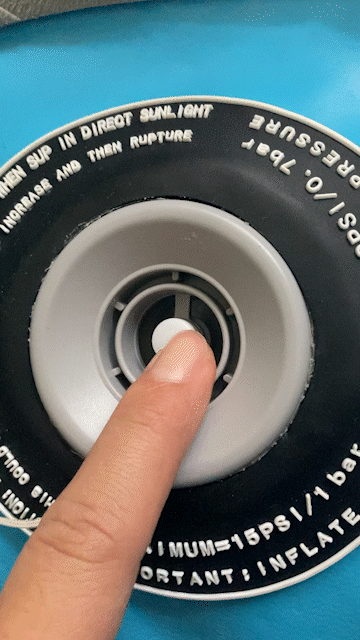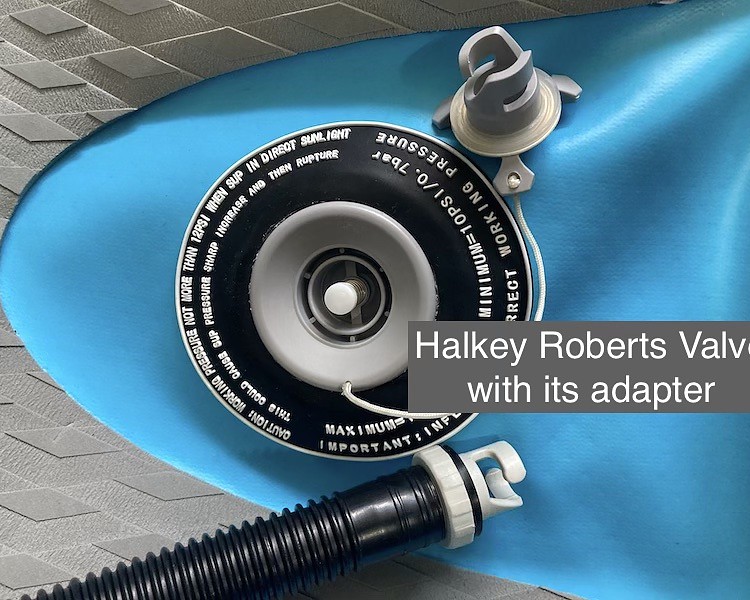Do you ever wonder how inflatable boats can hold so much pressure within?
They can do this thanks to ingenious valve designs. Modern valves don’t only handle high-pressure, but they also allow you to stuff air in without letting any out.
One such valve is the Halkey Roberts valve.
Halkey Roberts valves (or HR valves) are high-pressure one-way check valves. They are one of the most popular valves for inflatable boats today.
But what does a high-pressure one-way check valve mean?
How do you inflate and deflate with this valve?
And how can you fix your HR valve if it’s leaking?
I’m going to answer all of these questions and more for you today. This is my Complete Guide on Halkey Roberts Valves.
Table of Contents
Halkey Roberts Valves – What Are They?
Two features make the Halkey Roberts valve special:
- High-pressure
- One-way check
Let’s have a closer look at these.
High-Pressure Valves
We all want our inflatable boats to be as solid and buoyant as possible. To get this, we force quite a lot of pressure into our inflatable tubes.
| Part: | Recommended PSI |
| Main tubes | 2.5 – 3.5 |
| Keel | 4 – 4.5 |
| High-pressure air floor | 8.5 – 11.5 |
| SUPs | 10 – 20 |
Whether your boat is made of PVC or Hypalon, it won’t tear open as long as you stay within the recommended PSI. However, there is a weak spot.
The valve.
Once the pressure gets high, the trapped air will try to force its way out of the weakest spot. A lot of cheap valves won’t be able to handle this. They’ll give even before you reach the recommended PSI.
But not Halkey Roberts valves.
Halkey Roberts valves were made to handle high-pressure without breaking. Even if you go above the recommended PSI (don’t try this!), it won’t budge.
That’s one reason why you find Halkey Roberts valves in high-end inflatable boats.
The other reason is that they are…
One-Way Check Valves
What’s a one-way check valve you might ask?

Halkey Roberts One-Way Check Valve
If you’ve read my guide to Boston valves, you’ll be familiar with this. These types of valves allow air to go into your boat – but don’t allow it to get out.
They have a simple locking mechanism inside of them. When air is pumped in, the lock is pushed open. When the same air tries to escape, the valve locks shut.
This mechanism makes it very easy for you to inflate your boat. You never have to worry about air getting out while you’re pumping.
However, because of this design, you can’t just blow air into your boat. There’s a special way to inflate and deflate Halkey Roberts valves.
How to Inflate and Deflate Halkey Roberts Valves
Halkey Roberts valves are special. You can’t inflate and deflate them without knowing the proper way to do so.
Inflation
Not every pump will fit in a Halkey Roberts valve.
To do this, you’ll need a special adapter.
The good news is that Halkey Roberts valves are so popular, most air pumps come with an HR adapter already. If they don’t, you can easily pick one up from Amazon – such as this one by Melchef:
With this, all you have to do is plug in your pump and turn it on.
Easy, isn’t it?
Deflation
Weren’t Halkey Roberts valves designed so that air never gets out? How then can you deflate them?
Well, yes, but the designers weren’t stupid either. They knew that at some point, you’d have to deflate your boat. That’s why they built in a way to deflate through your Halkey Roberts valve.
When you open the cap of your HR valve, you’ll see a small pushpin. It’s the same pushpin where you plug in your pump for inflating. This time, you’re going to use it for deflating.
To do this, push this pin and turn it slightly until it stays down (if you don’t, it will pop right back up). This disables the locking mechanism and allows air to gush out from your boat.
Note: If your air pump has a deflation feature, you can use this to speed up the process. Make sure the pushpin is down when doing so.
Once your boat is deflated, turn the pin again until it pops back up. This enables the check-valve again and blocks the escaping air.
If air is somehow getting out even when the pushpin is back in position, you may have to troubleshoot your valve.
Troubleshooting – How to Repair and Replace Your HR Valve
Halkey Roberts valves come in three parts:
- The base which is built into the inflatable boat
- The middle which contains the pushpin and check-valve, and screws into the base
- The cap which covers and protects the pushpin from being pressed
Most HR valve problems happen in the middle. It is, after all, the most sensitive part.
Let’s take a look at some common problems and how to solve them.
1. Pushpin Pressed Down
A lot of people have come to me asking why air escapes through their pushpins. To that, I have one thing to say:
Pop your pushpin back up!
Too many people forget (or don’t know) that air will escape if the pushpin is pressed down. When they’re finished pumping, they panic because their boat deflates right away.
Always check if your pushpin is up. If not, turn it until it pops up. This way, the air won’t get out and you’ll save yourself from needless panic.
Also, always make sure the cap is properly in place. Nothing can hit your pushpin and press it down with the cap guarding it.
2. Can’t Inflate Halkey Roberts Valve Unless Open
When inflating, your pushpin should be closed.
However, one problem a lot of people run into is not being able to inflate unless their pushpin is open.
Once you detach the pump, air will gush out before you can close the pushpin. This way, you can never fill your inflatable boat properly.
Sound like you?
If this happens, you need an HR adapter with a crosspiece inside.
HR adapters rely on air pressure to force the pushpin down while inflating. Once you stop inflating, the pushpin pops right back up.
Unfortunately, this doesn’t work for everyone. Some pushpins are too stubborn for air to force them down. That’s why you need an HR adapter with a crosspiece.
Adapters such as Melchef’s and Bris’ have a crosspiece inside that pushes the pushpin down when you insert them.
Last update on 2025-07-18 at 17:47 / Affiliate links / Images from Amazon Product Advertising API
3. Dirty Middle/Base Screw
If your valve is leaking through the base, don’t go to the extreme and replace your HR valve right away. Try cleaning it first.
A lot of times, sand, dirt, and dust get caught in the threads and flanges of the middle/base screw. This is one of the first things you should check if your valve is leaking. Any debris here will prevent the valve from giving an air-tight seal.
Fortunately, this is a very easy problem to solve. Simply clean it out, and your middle/base screw will seal shut once again.
4. Loose Middle/Base Screw
If air still gets out after cleaning, you may have another very common problem:
Loose screws.
Fixing this problem is as simple as tightening the screw. To do this, you’ll need an HR valve wrench (such as this one by GY). With it, it’s super easy to tighten the middle part into the base.
Next, spray soapy water on the valve and watch for bubbles. If it continues to leak, tighten it more until it’s fully sealed.
Still doesn’t work? The problem may be something else.
5. Cross Threaded Middle/Base Screw
If cleaning and tightening don’t work, your problem may be a cross-threaded screw.
Unfortunately, there’s no way to fix this. The only solution is to replace the valve.
Thankfully, it’s not that difficult to do this. You can see how to replace your HR valve in this video:
Keep in mind though that not all HR valves are the same. There’s the old-short, new-short, and old-long HR valve – all three of which aren’t interchangeable.
Make sure you get the right replacement, otherwise, it’ll be a waste of time and money. You can buy all three types on Amazon.
6. Other Problems
If you find that there are other problems, you may want to call a professional. I can also help you with your HR valve problems. So leave a comment down below!
You might also want to check out How to Glue Your Inflatable Boat.

I created this site to help people – to help you – with your boat problems. Instead of helping one person at a time, I want this website to be the “one-stop-shop” for everyone’s boating concerns. Read more.






Tim
Saturday 24th of February 2024
Hi Steve,
I appear to have an unusual problem. The HR valves on the HP air floor of a dinghy that I purchased used will not lock open which makes it awkward to roll up the air floor when not in use, particularly if it's still in the dinghy.
It's a better problem than valves that won't leak of course but I'd like to fix if possible.
Thanks in advance for any advice you can give.
Beverly
Saturday 15th of July 2023
Thanks for this guide! It is surprisingly hard to find info on what that valve tool is for. Now I know. :)
greetje
Friday 14th of October 2022
Hi, How come one of the HR valves is not staying seated in one of the kayak's adapters to inflate it. The other 2 (bottom and right) are not an issue. Just happened from one day to the next. I don't see any obvious difference in the kayak attachment port compared to the ones that are no issue. Thank you Greetje
Andrew Sington
Saturday 13th of November 2021
Hello Steve - I have just acquires a BoatWorld inflatable with eh HR valves. As I have a leak in one of the chambers, I need to remove the middle part of the valve to pour in some special sealant. However the middle part valve just turns (though it's very still) and the thread seems to be locked. Can you recommend another method that will permit me to remove the HR valve. Many thanks.
Steve
Wednesday 1st of June 2022
Hello Andrew, If the leak in your chamber isn’t coming from the valve, it may be best to repair the leak another way. If you attempt to remove the valve in order to pour in the sealant, you may clog up the valve area.
If your air leak is coming from the chamber, then you would not replace it with sealant. You might need to clean or tighten the valve; if this doesn’t work, you may have a cross-threaded screw and will need to replace it.
Remember, the base of the valve is attached to the chamber–it isn’t meant to be removed. If you are struggling to remove the middle, try using a valve wrench. If the valve won’t twist off on its own, you may have to break it off and replace it with a new one.
Morgan
Wednesday 29th of September 2021
Hi Steve!! You are amazing, thanks for all that hr info. I rank Steve at 20 beers and 2 bottles of mt gay